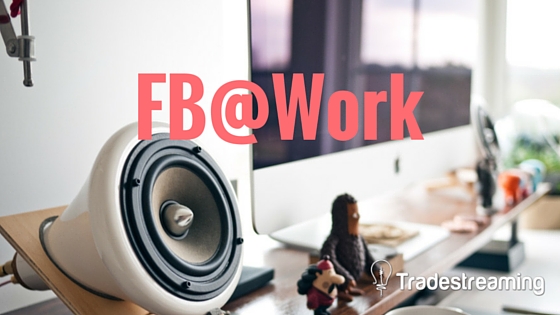Inside T. Rowe Price’s Facebook Live strategy
Fed launches Facebook page, Hawaiian shirt insanity ensues
Following RBS, should your firm sign up for Facebook at Work?
Facebook has made it clear for years that it wasn’t just satisfied attracting attracting over 1 billion individual users to the social network. Beginning in 2014, rumors coming out of Facebook showed that the company was working on a business product. Facebook wants to reach business users — the same users that spend more time on Linkedin while in the office. Users who turn to social networks not to post their most recent selfie, but to network in their industries, stay on top of impactful trends, and identify and connect with prospective clients.
FB@Work, as the product is now called, was just unveiled recently and the company just reported that it signed on RBS (Royal Bank of Scotland) as its largest customer to date.
What is FB@Work
The early version of FB@Work is very similar to the consumer version familiar to over 1.5 billion registered users of the social network. The difference is that the enterprise version will be a much more secure, walled garden. So, to start, RBS employees will be able to connect with their peers at the firm and congregate into user groups based on pre-defined permissions.
This functionality is similar to the types of internal corporate social networks popularized by Yammer (now owned by Microsoft) and Jive Software. The social enterprise market is already pretty saturated with tools that function like collaborative intranets and take communication and collective work to a whole new level for the enterprise. Time will tell whether FB@Work will take its social network and enable users to connect and communicate with workers outside their firms. Financial service firms have their own unique archival requirements when communicating with clients, so Facebook will have to work with outside technologies to ensure compliance standards are met. FB@Work doesn’t currently function as a technology platform that other 3rd party apps could integrate into but all signs and messaging out of FB’s management points to such a future roadmap for the product.
As purely a messaging tool, Facebook will have to compete with massive incumbent, Bloomberg for its share in the financial services arena. Symphony, a communications tool developed and owned by a consortium of financial service firms, is making waves in fintech circles as it raises a war chest of capital to compete against Bloomberg’s dominance in messaging.
RBS was on an early trial conducted by Facebook and employee usage dictated the firm’s decision to rollout FB@Work more broadly:
“The pilot we’ve been running demonstrated we were ready for more,” said Simon McNamara, Chief Administrative Officer at the Royal Bank of Scotland, who oversees the bank’s rollout of the service. “The adoption rate was a phenomenal 90%.”
It will take more marketing to convince large IT departments that FB@Work is worth the hassle. Financial services firms normally take the wait-and-see approach towards new consumer-facing technology, so it’s interesting to see a bank become one of FB@Work’s most-prized early customers. Some CIOs have already communicated a certain level of skepticism around adopting these new social tools from a player with no real experience in selling into and servicing the needs of the enterprise.
“Social interactions within the enterprise largely support structured communication, collaborative work, finding and sharing experts and expertise,” John Baptista, an associate professor of information systems at the U.K.’s Warwick Business School says. Facebook may try to emulate that, but it will “struggle because its nature is instead to support user-centered, unstructured postings and to follow emergent activity streams.”
Like any popular new consumer tech, large enterprises have to contend with unregulated and uncontrolled employee usage. Financial services firms have approached the meteoric adoption of smartphones with in-house and bought solutions to enable employees to use their own phones to access corporate files and data. FB@Work will have to allay fears that Facebook’s own solution will be enterprise-grade in terms of security, safety, and compliance.
RBS plans to have 30,000 workers on its FB@Work network by March of next year, and its entire workforce of 100,000 using the platform by the end of 2016.
[x_share title=”Share this Post” facebook=”true” twitter=”true” linkedin=”true”]
[x_author title=”About the Author”]
How to beat Wall Street by using Facebook, reading tabloids and shopping – with Chris Camillo
Chris Camillo isn’t a professional investor but he know how to invest.
 He turned $20,000 into over $2,000,000 by shopping at the mall, connecting on Facebook, and reading tabloids. Without even looking at a balance sheet or income statement, Chris takes big bets on trends he believes others aren’t aware of.
He turned $20,000 into over $2,000,000 by shopping at the mall, connecting on Facebook, and reading tabloids. Without even looking at a balance sheet or income statement, Chris takes big bets on trends he believes others aren’t aware of.
Then he heads to Facebook to validate his ideas with his social network.
He tells all in a new book, Laughing at Wall Street: How I Beat the Pros at Investing (by Reading Tabloids, Shopping at the Mall, and Connecting on Facebook) and How You Can, Too
Join Chris and me as we discuss his investment philosophy, how it works, and why he believes it’s a better way to invest.
Investing in the next mashup
Technology continues to run riot over a variety of industries. Nowhere has that been felt as acutely as in the music industry. Apple’s ($AAPL) iTunes may have changed the distribution model (selling over $1B in the last financial quarter alone), basically unbundling CDs and selling individual songs a la carte.
Music, it is a changin’
But the migration from analog to digital has been accompanied by a much more profound change — the revenue model of the music industry is undergoing a transformation. Where the model was previously selling musical media (artists generally made lots of loot by selling records/tapes/CDs), the model is changing to charging for music experiences (see my recent piece on the business of Broadway and concerts).
Artists embracing this change have shifted their model to almost giving away music (or charging fans whatever they want to pay) in order to capture some funds at the next concert.
Fast Company has a very interesting rundown on Girl Talk, a biomedical-engineer-turned-DJ who makes music by mashing up others’ tunes. Simply, he takes hundreds of samples of music and weaves them together, creating cool sounds but even more enjoyable live shows. He’s putting butts in the seats because he’s providing great live value.
IPOs, Social Media and the Era of the Mashup
We’ve all read how Facebook, Twitter, and LinkedIn are gearing up to go public sometime soon. While these services seem novel, in essence, they’re all just mashups of technologies and platforms that existed before Zuck entered his first frat party (not to sound snobby, but there aren’t frats at Harvard).
Startups and traditional companies are making lots of money just copying Groupon’s model of group discount buying. Travelzoo , a decidedly Internet 1.0 company, has a Groupon-like clone that offers expiring travel deals to its email list of over 20m and that 4-month old business is rumored to be valued at $400M. Abe’s Market, an Etsy-like green marketplace founded by my friend, Richard Demb, is experimenting with live selling online with its Abe’s Live, combining the breadth of vendor-driven supply and the entertainment value of a QVC.
The future of business is the mashup. Those companies who can climb to the top of the value pyramid — by leveraging and riffing on the work done on by those along the way — will win and that’s where investors should be looking to place their bets, IPO or not.
More Resources
How Girl Talk Mashes Up the Music Biz (Fast Company)
Top business books to read this summer
Here is a short compilation of top business books taken from the New York Times best seller list (if you purchase off these links, my Amazon account gets credited a minute sum). Hopefully, this is useful. Some, if not all, of these titles should be on your nightstand.
*************
The Blind Side (Movie Tie-in Edition) (Movie Tie-in Editions): As always, Lewis is a great story teller in the world of business and sports (think previous hit, Moneyball — a great read) and this tale of rags to fame was supported by a recent movie with the same title. My kids even enjoyed it.
Shop Class as Soulcraft: An Inquiry into the Value of Work: Like this one a lot. As a fan of Zen and the Art of Motorcycle Maintenance, this book eschews the cubicle life for something more valuable, real — and it’s found by using one’s hands and body.
The Accidental Billionaires: The Founding of Facebook: A Tale of Sex, Money, Genius and Betrayal: As a Harvard grad myself, I always find these sordid tales of great minds acting like lunatics while pursuing their fortunes. Facebook, the company and its founders, are totally complicit. Mezrich is a great writer (The movie, 21, was a takeoff of his Bringing Down the House)
Switch: How to Change Things When Change Is Hard: Heath Brothers (of Made to Stick fame) are at it again with a gameplan to help readers face hard changes in life and make them a little bit easier.
Sign up to get more real-time updates from me and Tradestreaming.









